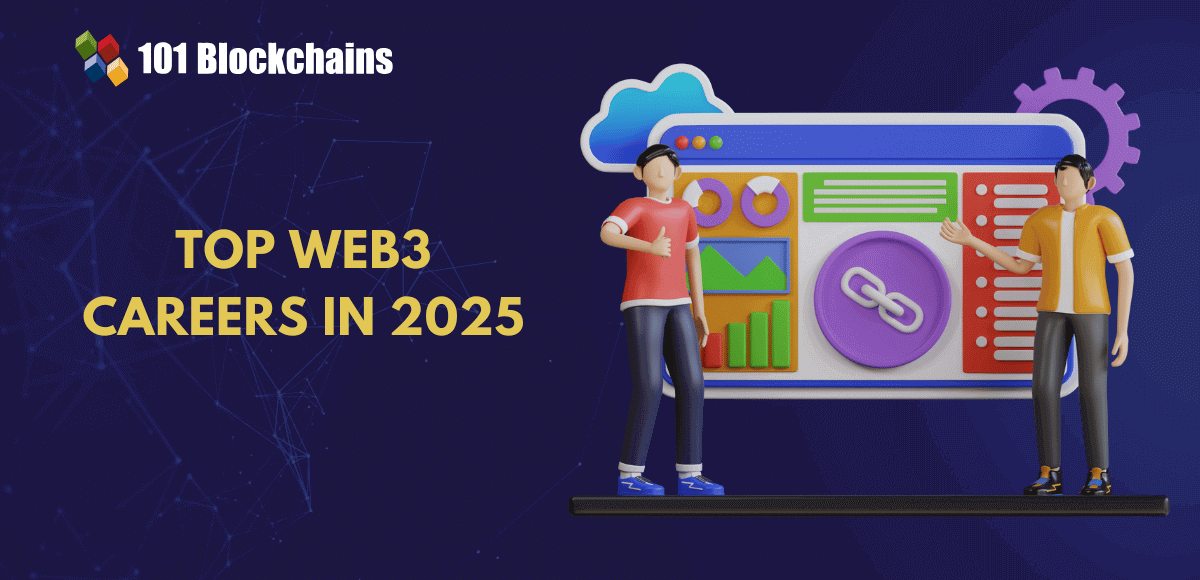Learn how blockchain truly works, master key definitions, and uncover what makes smart contracts so "smart." Dive into the fundamentals, gain valuable insights, and start your blockchain journey today!

Web3
James Howell
on July 15, 2022
The Insane Future of Web3
The internet and its metamorphosis over the years have never failed to grab attention. A few years ago, no one would have imagined that virtual worlds could become a reality one day. Now, the whole tech world is talking about the arrival of web3 or web 3.0. How will the future of web3 resonate with the future of the internet? Is web 3.0 an important part of the future of the internet?
All these questions call for emphasis on the value advantages of web 3.0 and its use cases. The following discussion helps you find more about the future of web 3.0 with a detailed reflection on its importance. You can also learn more about the different use cases of Web 3.0, which would strengthen the position of web3 as an important technology trend.
Aspiring to Become a Certified Web3 Expert? Enroll in Certified Web3 Professional (CW3P) Certification Course Now!
What is Web3?
Before you try learning more about web3 future, it is important to understand the term itself. You need to consider the fact that you don’t have ownership over any of your data on TikTok, Facebook, and Instagram. The internet most of us use today is considerably centralized in nature and stays in the control of major corporate houses.
On the other hand, the new alternative for these issues comes in the form of web3. Web 3.0 or web3 is an interesting concept pertaining to the next generation of the internet, and it shows the ability of users to control and owing to their digital assets and other online content. How will web3 change the world? The simple answer points to how big companies create and offer products and services through a centralized approach.
Let us assume the example of a social media network like Facebook. Do you own any of the data you have on Facebook? No, Meta has ownership of every asset on Facebook and also exercises complete control over the content created by users. The company has the right to ban or block you according to your needs. Another example of a centralized online platform refers to the online game Fortnite. The game does not allow any control of in-game identities and items. Therefore, it is quite clear that users cannot control or monetize the content they create with web 2.0.
Curious to develop an in-depth understanding of web3 application architecture? Join Standard/Premium Plan and Enroll Now in Web3 Application Development Course!
Importance of Web 3.0
The most critical piece of information you need for the answer to “How important is web3?” would point at how it resolves the problem visible with web3. You can think of the scale of the problem with web2 when you think of the industries and solutions associated with web2 right now. For example, over 2.5 billion gamers all over the world believe that the in-game assets are under their ownership, which is not actually the case.
Web3, on the other hand, provides an open ground for creating content alongside exercising control, ownership, and monetization privileges. How? Blockchain and cryptocurrencies are prime drivers of the developments in web3 alongside facilitating the foundation for NFTs.
You can develop a solid overview of the future of web3 by understanding how blockchain technology serves an important role in defining web3. Blockchain technology can help users interact with different online services under the governance of peer-to-peer networks. Peer-to-peer networks are basically decentralized networks of computers rather than centralized servers of a specific entity. In such environments, users have complete ownership of their data and can enjoy the privilege of peer-to-peer, permissionless transactions.
Therefore, blockchain can easily remove the need for intermediaries. If you have an internet connection along with cryptocurrency wallets such as Metamask, you can connect to world of web3. As a result, users would receive full control of their digital identities alongside the methods and timing of sharing data by using different online applications. Users can capitalize on their private keys to maintain security of their data and identity.
The plausible improvements offered by web3 over the existing web2 landscape showcase significant details about its working. As of now, the world is gradually moving faster towards web3. Who would avoid a decentralized network which can offer decentralization, transparency, and immutability for safeguarding your data? The web3 would spell some notable changes and different implications of data sharing and ownership alongside control over the digital identity.
Get familiar with the terms related to Web 3.0 with Web 3.0 Flashcards
Transformations Induced by Web3
If you want to learn about the answers to “Is web3 the future of the internet?” you must know the different ways in which it is changing the world right now. Web3 solutions have been dominating the center stage of transitions in major areas such as storage, browsers, social networks, finance, and operating systems. Gradually, the internet is moving towards the web3 principles for introducing an internet of assets. How is this change happening? Some of the notable examples of the transition toward web3 include the following,
- Storage systems have been changing preferences from Google Cloud, AWS, and Microsoft Azure towards IPFS.
- New browsers such as Brave present a decentralized alternative to the popular web2 browser, Google Chrome.
- The web3 future would also highlight the massive changes in finance with preferences for crypto wallets such as Metamask instead of conventional banks.
- Centralized operating systems such as Windows, Android, and iOS in the web2 fall short of many capabilities introduced in web3 operating systems such as EOS and Ethereum.
- The shift towards the future of web3 would also highlight the rise of new decentralized social networks such as Steemit instead of centralized alternatives such as Facebook.
Another formidable example for showcasing the transition toward web3 focuses on the growth of DAOs as an alternative to traditional operating models for organizations such as LLCs. You can notice how web3 is indeed the future with transitions from centralized systems and processes towards decentralized blockchain networks.
Excited to develop fluent knowledge of the DAOs? Join Standard/Premium Plan and Enroll Now in DAO Fundamentals Course!
Will Users Welcome Web 3.0?
The inevitable nature of change in the working of internet and how users interact with it is one of the foundation pillars of web 3.0. The answers to “How will web3 change the world?” are important for every internet user. Web3 not only guarantees ownership of your own data, assets, and digital identities but also enables the benefit of data privacy.
The existing web2 environment cannot guarantee complete data privacy, especially when centralized agencies have control over user data. You have to register for a particular service before you can use it, and in the process, you offer your private data to access its functionalities. Remember the “terms and services” in almost every application on which you click “I Agree” without reading them in most cases.
On the contrary, you can find affirmative responses for “Is web3 the future of the world?” on the grounds of decentralized data storage. You don’t have to worry about any single organization or entity taking control over user data. Web 3.0 presents the foundation of an open internet, accessible to everyone, with the advantages of transparency and security.
You don’t have to register for any service and can exercise complete control over your personal data. On the other hand, web3 imposes the necessity of safeguarding your own data and assets as custodians. Interestingly, some of the renowned players in the web2 domain have been incorporating elements of web3. For example, Twitter has already introduced NFT profile pic verification.
Above everything else, new consumer behaviors associated with web3 showcase how users are gradually adopting web3. The new initiatives such as growth of NFTs, DAOs, and play-to-earn games show that users are opening up to web3 applications. The most probable explanation for “How important is web3?” is evident in how web3 would find acceptance by users. Web 3.0 would redefine the new generation of internet, governed by a specific set of standards, rules, and guidelines for all internet users. The impact of web3 would not be restricted only to specific applications as it would define the complete internet.
Aspiring to Become a Certified NFT Expert? Enroll in Certified NFT Professional (CNFTP) Course Now!
Stepping Into the Future with Metaverse
The most plausible explanation for web3 showcases it as a set of standards for the new internet. Where do you see web3 going forward? As a matter of fact, the discussions on future of web3 often revolve around the scope of its applications. The most notable example for proving the same points at the metaverse. Virtual worlds accessible through VR and AR gadgets offering a shared and persistent environment define the metaverse.
It is a seamless virtual world that would function just in parallel to real-world activities. Although the concept of the metaverse is building up gradually, it would open up many opportunities for the future. The metaverse would develop as a massive virtual world that allows facilities for different tasks and activities such as working, learning, socializing, and entertainment.
The metaverse draws the best of virtual experiences such as social media and gaming along with virtual reality and augmented reality. You can find answers for “How will web3 change the world?” in the description of the metaverse. It would serve as the three-dimensional internet. The content on web3 is presented in the form of three-dimensional objects, thereby providing a new type of user experience.
For example, online gaming is possible by playing games in three-dimensional spaces, which allow users to interact with ease other as the in-game avatars. Users could engage with web content and the internet virtually along with an immersive experience of the virtual spaces. The integration of virtual reality headsets could enable users to enjoy physically and visually immersive experiences. As of now, the possible applications of the metaverse are targeted at social media, education, work, and entertainment.
Aspiring to Become a Certified Metaverse Expert? Enroll in Certified Metaverse Professional (CMP) Certification Course Now!
Will Metaverse Be the Future of Web 3.0?
Web 3.0 refers to standards, and the metaverse is a technology solution. The metaverse would obviously play a crucial role in the future of web3, owing to its practical value advantages. Most important of all, any single entity does not have control over the data and assets of users. Many of the early-stage metaverse platforms are under the ownership of different service providers.
The example of Facebook and its transition to Meta is the best highlight for the future of the metaverse. The tech giant has hired a team of 10,000 people to work on its metaverse development project. Most important of all, the influx of capital with around $50 million USD and creation of new jobs offer a solid boost to the growth of metaverse. Companies like Facebook would still remain centralized owners of every interaction and experience on the metaverse.
In such cases, data custody and safeguards for digital identities become an important concern. New players in the domain of metaverse serve as an effective outline pertaining to the future vision for the metaverse. Therefore, the web3 future with metaverse would only serve some actual change if they help in decentralization and focus on user ownership.
The different rules and guidelines with web3 for implementing decentralization would develop the trust of users regarding decentralized control over user experiences and data identity. The metaverse is a virtual space, and web3 provides the opportunity for a decentralized internet and can offer one of the foundation elements for connectivity in metaverse.
In addition, the creator economy concept in metaverse would offer an ideal route for supplementing the vision of web3 in creating a financial ecosystem with decentralized solutions. The transition towards decentralized web3 would also imply the bridging of gaps between the virtual and physical worlds.
At the same time, the future of web3 would also revolve around the factors of interoperability, open-source verification, safe data storage, and exchange. It can only help in assuring users that they can use and interlink assets alongside transferring them from one world to another seamlessly.
Find out some of the top predictions for web3 now with Top 5 Web3 Predictions For 2024.
Other Use Cases of Web 3.0
The important applications of web3 don’t revolve around the metaverse only. You can find many important use cases of web3 building up, such as web3 social media. The future of social apps on web3 would be more similar to the normal social apps of today with a focus on simplicity. Web3 social apps may also fetch the attention of crypto enthusiasts and the younger generation of internet users in future.
Web3 can gain a lot of traction in the future with play-to-earn gaming. The massive surge in popularity of play-to-earn games such as Axie Infinity has shown the way forward for web3 gaming platforms. Decentralized storytelling would also emerge as one of the significant use cases of web3 in the future.
It focuses on resolving the problems of community involvement in storytelling. Another notable highlight in “How will web3 change the world?” would point at wallet-aware sites and data ownership. The developments in blockchain technology, such as DAOs and zero-knowledge proofs, serve as an effective boost for the future of web 3.0.
Build your identity as a certified blockchain expert with 101 Blockchains’ Blockchain Certifications designed to provide enhanced career prospects.
Bottom Line
The basics of web3 suggest how it can serve as a transformative force in the user experience and the design of the internet. People want to try the new decentralized solutions, and the interest of users in crypto and NFTs proves the same. However, the future of web3 must also cover a lot of challenges before transforming into a full-fledged standard applicable throughout the internet.
As of now, the developments in the world of web3 have proved how successful web3 will be in the future. Most important of all, the assurance of decentralization, data privacy, and control over digital identities can also serve as crucial advantages for internet users. Learn more about web3 solutions and their value advantages now.
*Disclaimer: The article should not be taken as, and is not intended to provide any investment advice. Claims made in this article do not constitute investment advice and should not be taken as such. 101 Blockchains shall not be responsible for any loss sustained by any person who relies on this article. Do your own research!





